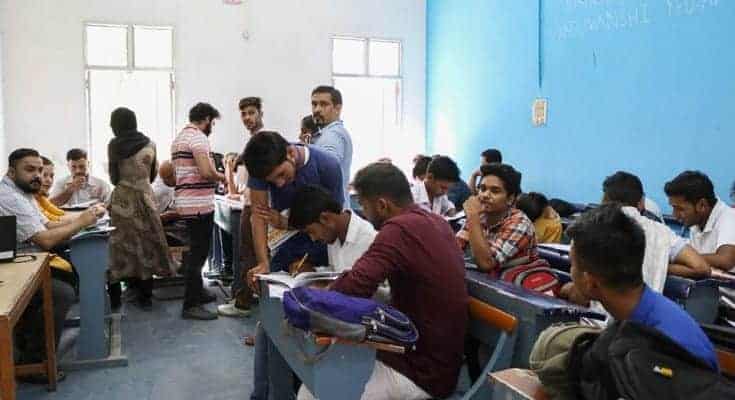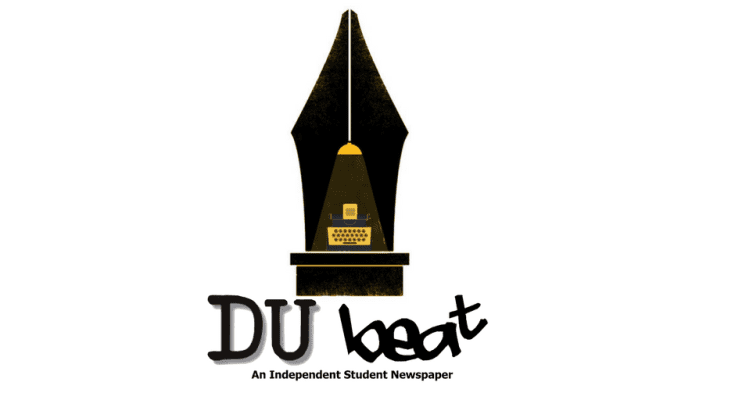Protests about anomalies in DU’s PG admissions have recently raised concerns about the transparency of the admissions process. While many PG applicants came forward questioning the rejection of their admission applications without an adequate reason, the DU administration refuted such claims, stating that the rejection was due to failure to meet “program-specific eligibility criteria.”
The University of Delhi started its first round of seat allocation for postgraduate admissions on August 17th. Shortly after that, students began to dispute the allocation process and claim that their forms were rejected for no reason at all. This provoked widespread uproar, with student organisations such as SFI and AISA holding protests. While the disclosure of a merit list and re-consideration of rejected applications were among the primary demands, other PG aspirants want the process halted and replaced with a fresh, transparent admissions process.
The fair solution is to cancel the first round and hold it again after considering all eligible students.”
A Twitter user tweeted
Some of the major allegations against the university admission process are as follows:
Within the same category, candidates with lower marks are assigned a college, while those with higher marks are not.
One of the major concerns about the admissions process was the lack of transparency in seat allocation. DU did not officially release a merit list this year. With reports of students with low scores within the same category being assigned a college while those with better marks were not, there was a great deal of uncertainty among students.
The SFI Delhi State Committee released a statement condemning the arbitrariness of Delhi University’s M.A. admission process.
Delhi University did not release a provisional rank list or cut-off list, thereby undermining the transparency of the admission process. The criteria on which the selection of candidates depends remain unspecified.”
-SFI Delhi Instagram Post
Many applicants who were offered seats in the first round were denied admission. Students argue that no rational explanation was provided.
Many students allege that they were offered a spot in the first round of admissions but that their applications were rejected. Applicants argue that neither the college nor the admissions office provided them with a legitimate reason.
I had applied for admission in PG at DU through CUET PG 2023 and was allocated Motilal Nehru College. But the college authority abruptly rejected my allocation, citing the reason ‘invalid documents’ without even specifying the name of the document. However, the documents I uploaded are correct and valid. This is just sheer misuse of authority, and candidates like us who work so hard to get admission to such prestigious colleges feel cheated and dejected. This is happening to so many candidates, not just me.”
-Anish tweeted
Some students alleged that their forms were rejected because they were flagged as “wrong category (C1 and C2)* selection” even if the category they chose was correct.
(C1 = Those students who graduated from another recognised institution as well as those enrolled in the programme degree at DU
(C2 = students who completed their degree with honours in the subject for which they are applying.)
The uncertainty over categorization was one of the most serious and evident flaws in the admissions process. Many students were refused admission due to category selection errors. Students contend that they picked the correct category. The mistake was made by the university.
My form clearly shows my category, but still, my form got rejected, stating “wrong eligibility criteria..
– A PG applicant
Significant variance in the difficulty level of CUET PG papers and question repetition
Some disciplines’ CUET PG exams were held in two stages separated by approximately 2-3 weeks. Students who took the first phase say that the phase 2 paper was way too easy. Not only that, but several of the questions in the Phase 2 paper were repeated or restructured.
For example, CUET PG Paper for M.A. English
- Question ID: 92090624040 – French_____ (structuralism) was inaugurated in the 1950s by cultural anthropologist Claude Levi-Strauss.
Directly linked to Question ID: 6863409182 from Phase 1: Who among the following is not a post-structuralist critic (Levi-Strauss)?
- Question ID: 92090624021 – Gorboduc, the first English tragedy, has been written in ___ (blank verse)
Repeated in: Question ID: 9209064063 – Which of the following plays was written in blank verse? (Gorboduc).
- Question ID: 92090624033: Savitri, an epic in blank verse, was written by ___ (Sri Aurobindo).
Repeated from Question ID: 6863409149 from Phase 1: Savitri, a literary epic in English, was written by ____ (Sri Aurobindo).
We expected normalisation to happen, but NTA didn’t do that for us.”
-A PG aspirant who appeared for the M.A. English Entrance
Many student organisations protested against this level of dispensary in the admissions process. The Student’s Federation of India (SFI) organised a demonstration outside the Arts Faculty and handed in a memorandum calling for the admission of all competent applicants who had been wrongfully denied admission as well as for greater transparency in the admissions process. A video explaining the problems with the admissions process was also issued by SFI Delhi on their Instagram page.
The All India Students Association (AISA) also organised a protest at the admission block, calling for the prompt release of all admission lists as well as compensation for all discrepancies. Students who had been waiting for three days at the admission block to have their problems resolved joined the protest.
AISA activists reached the admission block and saw that more than 50 students were lined up in anticipation of their admission. AISA activists raised slogans against the lack of transparency and demanded that the admission in charge come out and answer all queries. The administration was adamant about not listening to the students. The admission in charge did not even bother to come out. However, the persistence of the protesters resulted in a partial victory, and the C1, C2, and CGPA change issues were solved.”
-Anjali, AISA DU Secretary
Finally, on the 21st, the university issued a notice addressing these issues, but students contend that the notice was only a formality and did not address their problems.
Those candidates who had chosen Category-1 in their applications and have been rejected due to non-fulfilment of “Programme Specific Eligibility” criteria in Category 2 will be considered in Category-1 in subsequent lists as per their merit.
Those candidates who failed to convert their CGPA score into percentage (%) despite several announcements made by the university in this regard may be able to do the CGPA to percentage conversion in the mid-entry window. Such candidates will be considered mid-entrants.”
– Notice released by the Admission Branch
Many students said they were refused entry to the admission block on the north campus. Students also alleged that the admissions branch wasn’t responding to their calls or emails.
Rejecting applications in the first round without any reason and then considering them in subsequent rounds with leftover seats is unfair.”
– Shivam, A PG Applicant
The degree of transparency of the CUET admission procedure for both UG and PG programmes has always been an important area of concern. However, such blatant carelessness and mistakes in the admission procedure cast doubt on the credibility of admission through this method and risk the future of the students. The University of Delhi is one of the biggest and most prestigious central universities in India. Such large-scale dispensaries in the admission process only serve to highlight the state of the education system in our country. To answer these questions and provide transparency in the admissions process, the university should release a merit list. Along with this, the institution should set up an experienced grievance committee that addresses student complaints respectfully and assists them with the admission process.
Image Credits: DU Updates
Dhruv Bhati







